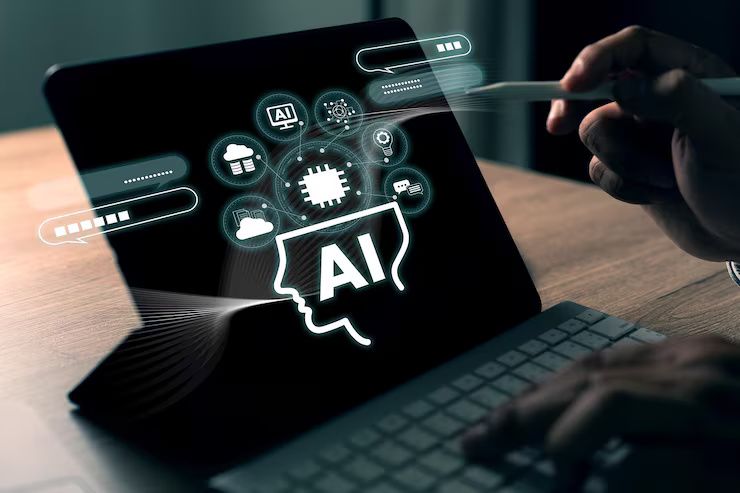Web applications have evolved significantly over the past decade. From static websites to dynamic, user-centered platforms, businesses now seek apps that not only perform but also predict user behavior, automate tasks, and deliver personalized experiences. Artificial Intelligence (AI) plays a key role in this transformation.
AI in web app development refers to the use of machine learning models, natural language processing (NLP), computer vision, and automation to improve how applications function. This could mean integrating chatbots, recommendation engines, fraud detection systems, or predictive analytics.
The main reason AI is being adopted in web development is to enhance efficiency and user engagement while reducing operational costs. With global digital transformation, businesses across sectors—from e-commerce to healthcare—are integrating AI into their web applications.

Importance – Why AI in Web App Development Matters Today
AI-driven web applications are no longer a futuristic concept but an industry standard. Their importance lies in several areas:
-
Personalization: AI algorithms analyze user behavior to recommend products, content, or services tailored to individual preferences.
-
Automation: Tasks such as customer support, data entry, and transaction monitoring are automated, saving time and resources.
-
Security: AI tools detect unusual patterns and protect against fraud or cyberattacks.
-
Efficiency: Developers can use AI-assisted coding tools to optimize workflows and reduce errors.
-
Scalability: Businesses can handle more users and data without compromising performance.
According to reports from Statista and Gartner, the demand for AI-powered applications is steadily increasing, with businesses investing heavily in AI-driven tools to stay competitive.
Recent Updates – Trends and Developments in AI Web Apps
Over the past year, several notable updates have influenced AI adoption in web app development:
-
Generative AI Integration (2023–2024): Web apps increasingly use generative AI models (like ChatGPT or Claude) for content creation, coding assistance, and customer interaction.
-
Low-Code AI Platforms: Tools such as Bubble and Retool now integrate AI components, allowing businesses to build applications faster without extensive coding knowledge.
-
AI for Accessibility: New frameworks are making apps more inclusive by automatically adding captions, translations, and adaptive designs.
-
Edge AI in Web Apps: AI computation is moving closer to users (on devices), improving performance and privacy.
-
Voice-Powered Interfaces: With smart assistants like Alexa and Google Assistant expanding, more web apps integrate voice-controlled functionalities.
These developments are reshaping how businesses and developers approach app design.
Laws or Policies – How Regulations Affect AI in Web Development
AI in web app development is shaped by several laws and policies, depending on the region:
-
Data Privacy Laws: Regulations such as the EU’s General Data Protection Regulation (GDPR) and California’s CCPA dictate how user data is collected, processed, and stored. AI-based personalization and analytics must comply with these laws.
-
AI Act (European Union): The proposed AI Act focuses on classifying AI systems by risk levels, affecting developers who integrate AI in apps across Europe.
-
Cybersecurity Frameworks: Governments enforce cybersecurity standards to protect user data. Developers must ensure AI-driven web apps align with national cybersecurity rules.
-
Accessibility Laws: In many countries, web applications must comply with accessibility guidelines like WCAG to ensure inclusivity, especially when AI features are involved.
These regulations ensure ethical AI adoption, focusing on transparency, fairness, and user safety.
Tools and Resources – Helpful AI Solutions for Web Developers
Several tools and platforms make it easier for developers to integrate AI into web apps:
| Category | Tool/Resource | Use Case |
|---|---|---|
| AI Frameworks | TensorFlow, PyTorch | Machine learning model development |
| Chatbot Platforms | Dialogflow, Microsoft Bot Framework | Customer support automation |
| AI-Powered APIs | OpenAI API, Google AI, IBM Watson | NLP, image recognition, sentiment analysis |
| Low-Code AI Platforms | Bubble, Retool, Mendix | Building AI-enabled apps without heavy coding |
| Testing & Debugging | DeepCode, Codota | AI-assisted code reviews |
| Project Collaboration | GitHub Copilot, Tabnine | AI-driven code completion and suggestions |
| Analytics & Monitoring | Mixpanel, Amplitude with AI features | Predictive analytics and user behavior tracking |
These tools help streamline development while reducing manual effort and improving performance.
FAQs – Common Questions About AI in Web App Development
Q1. What are the main benefits of using AI in web applications?
AI helps enhance personalization, improve security, automate workflows, and deliver better user experiences while reducing operational costs.
Q2. Do developers need deep AI knowledge to build AI-powered web apps?
Not always. With low-code/no-code AI platforms and pre-built APIs, even developers with limited AI expertise can integrate intelligent features into their apps.
Q3. How does AI affect web app security?
AI enhances cybersecurity by detecting unusual patterns, preventing fraud, and monitoring user activities to block suspicious behavior in real time.
Q4. What industries use AI in web apps the most?
E-commerce, healthcare, finance, education, and customer service sectors are leading in adopting AI for web apps.
Q5. Is AI in web app development expensive?
Costs vary. While advanced AI models can be expensive, many affordable APIs and open-source frameworks allow businesses to experiment without large investments.
Final Thoughts
AI in web app development is reshaping how businesses operate and how users interact with technology. It improves efficiency, personalization, and security while offering scalable solutions. As regulations evolve and tools become more accessible, the adoption of AI in web development will continue to expand.
For businesses and developers, embracing AI is no longer optional—it’s becoming a necessity to remain competitive in today’s digital-first world.
